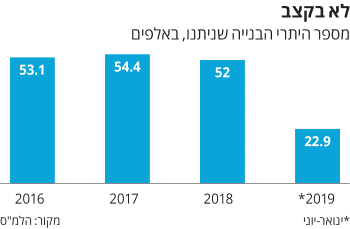Hadar Horesh, themarker.com
The housing market has been underway for months without substantial involvement of the Finance Minister Moshe Kahlon, or down in the housing, and now it turns out that local authorities do not work diligently for the benefit of increasing the volume of construction: Central Bureau of Statistics shows that in 2019 there has been in a decline in building permits, and compared to -2018, the number of permits decreased by 12% - in the near future which would lead to reduction in the number of new homes, not having handed government targets - and the rise of prices in the market.
Bureau shows that in the first half of 2019 were issued building permits local authorities to -22 865 apartments only, compared to permits for apartments 2018 -52 035 -54 406 flats and the height in 2015. The number of permits for construction reflects the number of dwellings permitted to begin construction in accordance with plans approved in committees, including the Committee on the housing complexes favorites (and formula).
An increase in the major cities, except for Haifa
In most major cities, except for Haifa, a substantial increase: Tel Aviv, for example, expected 2019 to be a record year for providing permits. City permit issuance rate rose in all four years, reaching 2018 to -3759 apartments, the highest number since 2012, when permits were issued for construction of 4,620 apartments. During the first six permits were issued for construction of 2,596 apartments, a rise of 43% rate of authorizing the previous year.
Netanya, the number of approvals fell last year by 61% to -480. Half 2019 increased pace of granting approvals by 26% and the number of approvals totaled 304 apartments - still less than half the pace of approvals in 2017. Permits distribution rate increase was also recorded in Beersheba. Haifa, which reached a peak of 2,123 permits in 2017, the number of dwellings dropped to -668 Only last year, a negligible number of 71 apartments half of 2019.
Haifa situation largely reflects the general situation in the North. Afula, the number of permits fell last year by more than 50%, and in the first half of the year, the pace of permits by a third. But in Safed, 36 permits were granted half of 2019, compared to 38 during all of the previous two years.
A sharp drop in building permits considerably in most Arab towns and smaller communities, where the housing shortage is greater than in other communities. Government plans to increase the supply of homes in Arab communities do not receive hourly expression of reality: Shfar'am, the number of permits dropped from -229 dwellings in 2017 to 66 apartments in 2018, and 31 apartments in the first half of 2019. Tamra, permits were issued last year to 118 apartments, but half of 2019 the number dropped again to 28 only.

Moder Younis, head of the council appealed and the Chairman of the Forum of Arab Authorities Local Government Center, said in response that he does not have data on the decrease in permits - but in practice there is no change in the status of permits in Arab municipalities where there is almost no approved construction plans, and, conversely, the growing tendency of residents to obtain permits and to avoid illegal construction.
Local elections only slowed the pace
The decline in the volume of building permits has been explained in the past 2018 municipal elections, which caused a slowdown in activity of systems, and the particular uncertainty among entrepreneurs. Estimates were that after the elections, held in November, will increase the rate and delayed plans to be submitted for a permit.
In practice, however, it seems that the elections resulted in only a further slowdown in the pace of obtaining permits. Ramat Gan, for example, led in 2018 with permits and 2020 apartments, number of permits fell in the first half of 2018 only to -418. The reason is known: the mayor-elect, Carmel Shama, declared war plan 38 programs - were the source of most applications for permits - the city that remained virtually vacant space for housing. At the same time, other agencies began to re-examine building plans and urban renewal, as a result of the failure in planning appropriate infrastructure: roads, sewer systems, water and electricity, schools, gardens and public institutions. among the authorities have announced plans to delay the promotion of housing, because of lack of infrastructure, include Yavne, Ashkelon, Herzliya, Ramat Hasharon Beit Shemesh.
Haim Moshe Feiglin, Vice President Builders Association Builders of the country, said: "There is a clear trend in cities harden and reduce the volume of housing construction. Decisions on reducing the housing area of urban renewal encourage the recalcitrant Pinoi-binoi as tenants receive a smaller return. Authorities stirring slogans on promotion urban renewal, but actually hinder plans and hinder performance. "
Eitan Atia, 15th CEO Forum, which brings together the cities managed without government grants, believes that affects the transition from a decline in permits. "Local elections a year ago and for completion of the Knesset elections and the government has a great influence on it. Once the city does not receive funds as promised and agreements not respected, this is the result. The decline in building permits is one of the hallmarks lack of governance ".



